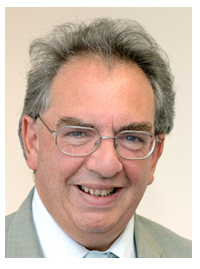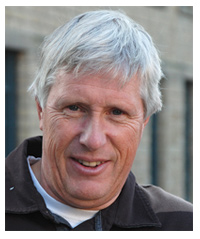Task force
Tue, 21 Feb 2012 13:06:00 GMT
 University's dual role in major policing probe
University's dual role in major policing probe
A UNIVERSITY of Huddersfield professor who is a leading expert on crime prevention nationally and internationally has been invited to join a major enquiry into the future shape of policing in Britain. Alex Hirschfield (pictured right) will draw attention to the way in which the police’s role in crime prevention and Neighbourhood Policing may change in the future as reductions in police numbers and the Localism Act, which is de-regulating the planning system, take effect.
And the University – an important centre for criminology and forensics research – has secured an impressive double. The project manager of the newly-launched Independent Police Commission is Ray Dance, a former West Yorkshire police superintendent who has been a member of staff at the University of Huddersfield for the past two years, directing the programme of forensics courses.
His job will be to ensure that the large number of academics and other experts contributing to the Commission’s findings deliver their work on time. And he will also ensure that there is no duplication of effort.
The Independent Police Commission is chaired by Lord John Stevens, former Commissioner of the Metropolitan Police. Professor Hirschfield, who heads the University of Huddersfield’s Applied Criminology Centre, has been recruited to join the commission’s Advisory Panel, which includes academic experts, leading professionals from the police and security services, forensic scientists, lawyers, judges and media figures.
Professor Hirschfield has attended the inaugural meeting of the Commission, at the House of Lords. “It got off to a very good start and Lord Stevens was excellent,” he commented.
The Commission will call on expert testimony from figures such as former home secretaries, but also intends to canvas the views of the public, including young people. It aims to probe the role of the police and what is expected of them in a modern society.
The police’s relationship with the criminal justice system and the agencies of the state will be examined, along with ways of ensuring that the police are accountable to the public without being burdened by too much bureaucracy. The Commission’s goals will also be to find the best way of managing resources in order to get the most out of police spending.
Professor Hirschfield’s principal role will be to analyse and debate the contribution that the police make to crime prevention, one of his major areas of research.
“The question I shall raise is the impact made by a reduction of 16,000 in police numbers nationwide,” said Professor Hirschfield. He is also concerned that relaxations in planning regulations and a cut in the number of architectural liaison officers employed by the police and local authorities will have an impact on successful crime prevention schemes known as Secured By Design
The Commission, although instigated by Shadow Home Secretary Yvette Cooper, is entirely independent – a pledge that Lord Stevens made at the inaugural meeting.
“I think this Commission will take an objective view of the challenges confronting the police as a service and policing as an activity and will have an impact because of the calibre and range of expertise that it can call upon,” said Professor Hirschfield.
 During his police career, Project Manager Ray Dance (pictured left) was involved in a large number of projects revolving around change in policing, although the Independent Police Commission is the biggest and one of the most demanding he has taken part in. The schedule is tight. Evidence hearings begin in March and the findings are due to be published in little over a year’s time.
During his police career, Project Manager Ray Dance (pictured left) was involved in a large number of projects revolving around change in policing, although the Independent Police Commission is the biggest and one of the most demanding he has taken part in. The schedule is tight. Evidence hearings begin in March and the findings are due to be published in little over a year’s time.
Although his background means that Mr Dance has strong views on policing, he will keep his counsel.
“I will try not to have any input in terms of policing. That’s important, because I am there to manage the project, not to make an impact on the contents,” he said.
He shares Professor Hirschfield’s view that the Commission is a significant initiative.
“It is important for the University of Huddersfield and its criminology research. This Commission is very high profile and it will give us all an insight into the direction that policing is moving in, which been a political hot potato for a long time. As a minimum, the findings of the Commission will influence the Labour Party’s next manifesto and will also inform public debate,” said Mr Dance.
The new Commission is a response to important changes in the governance of the police – including the introduction of elected local Police and Crime Commissioners – that will be ushered in by legislation passed last year. Elections are planned to take place in November 2012.







